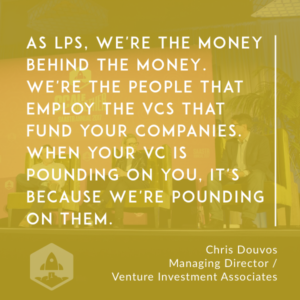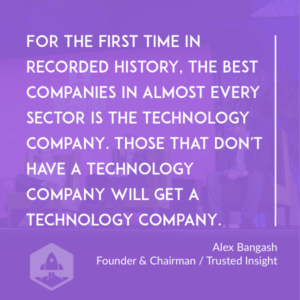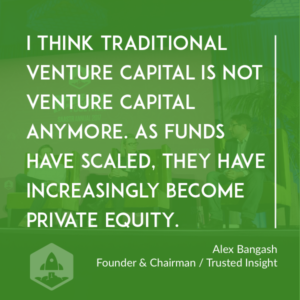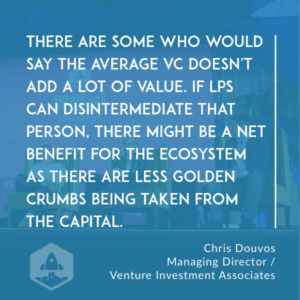We all know who VCs are and what they do, but where exactly do they get their money? The investors that give them their money–the funds that could eventually end up in your SaaS company–want 3x return for every dollar. So when a VC is pounding on you to get something done, it’s because their LPs are pounding on them to get it done.
Harry Stebbings, Host of The Twenty MinuteVC & SaaStr Podcast, moderates this session with Elizabeth “Beezer” Clarkson, Managing Director at Sapphire Ventures; Chris Douvos, Managing Director at Venture Investment Associates; and Alex Bangash, Founder & Chairman at Trusted Insight, as they share wisdom and advice as LPs.
One important thing to note? Seek out VCs who offer more than just money. As an entrepreneur, you may start getting calls from LPs who want to co-invest and when those calls start coming in, you should ask yourself what they’re trying to achieve. If they’re just “dumb money,”, then you have to decide if that’s what’s right for your company.
And if you haven’t heard: SaaStr Annual is only two weeks away, and we’ve made it bigger and better than ever! Join 10,000 fellow founders, investors and execs for 3 days of unparalleled networking and epic learnings from SaaS legends like Jon Miller, David Steinberg, Jennifer Tejada, and Eoghan McCabe. If you don’t have tickets, there’s still time to grab yours today and bring your team from just $999! (Hurry before they’re all gone!) Get tickets here.
TRANSCRIPT
David Appel: Hey, everybody. My name is David Appel. I’m Head of the Software and SaaS Vertical at Intacct. We are sponsors of the tactical stage. Thank you for coming to this session instead of any of the other ones. Usually we’ve got gang house packed in, but I think the center stage is pulling people. I think that’s a mistake, because we got a fantastic session right now.
A good friend of mine, Tom Barnds, of Accel KKR, once said this phrase to me, “Everybody is labor for somebody else’s capital.” That’s the session that we’ve got right now, which is for all of us who are investors or portfolio company leaders, we’re trying to make our investors a return, but then the investors are labor for somebody else’s capital.
That’s what today’s session’s fantastically about. I’m going to introduce our panel in just a moment, as they’re going to give you perspective of what are the LPs asking the venture capitalists so you have some context to know what your customers’ customers are looking for.
Harry Stebbings is going to be our moderator. For those of you who don’t know Harry, Harry is leader of the podcast, “The Twenty Minute VC,” 130,000 subscribers. If you haven’t subscribed to it, I suggest it. He’s also in charge of the “Official SaaStr Podcast.” Then we’ve got three great investors. Beezer is from Sapphire Ventures, a great firm.
Alex is from Trusted Insight, and Chris is from Venture Investment Associates. With that, allow me to introduce the four of them. Thank you.
[applause]
Elizabeth Beezer Clarkson: Thanks, man. There you go. You can scoot on over.
Harry Stebbings: Before we start today, I do want to just kick off a little promotion here for Chris. Now, Chris is slightly behind Beezer in Twitter followers. If you get out your phones now and follow @cdouvos, D O U V O S, he will get closer to Beezer. He’s 2,000 behind. Just please look that face, you can’t say no.
[laughter]
Chris Douvos: Seriously. It was my Christmas wish to catch up to Beezer. Then she went to Europe, and the next thing I know, it’s like, “Broom!” It’s like…
Beezer: I just told you. You’ve got to start investing in Europe. Do we have people from Europe here? Anyone in the crowd? See? See?
Chris: Alright. I’m on it.
Harry: Let’s start the LP panel with, for anyone that doesn’t know, what are LPs and why do they matter in our ecosystem. Let’s start with that. I’ll start with you Chris. What are LPs and why do they matter?
Chris: As LPs, we’re the money behind the money. We’re the people that employ the venture capitalists that fund your companies. When your venture capitalist is pounding on you and telling you that you need to make this thing work, it’s because we’re pounding on them, saying we want three X.
LPs can only count to three. It’s like that’s our multiple. That’s our hurdle rate. Anything else beyond that is a once in a lifetime kind of thing, but we’re pushing all our GPs to get capital, Moola in the Coola. We give money and we give our GPs a dollar, and we want it to come back with two of its friends for a total of three.
Harry: Absolutely. I do want to then go to you, Beezer. You said about three X. In terms of different funds size, obviously returns are very different according to the fund sizes. You’ve invested in lots of local grown [inaudible 3:13] , different fund sizes and local [inaudible 3:15]. Is the return expectations different then, according to the fund size?
Beezer: Not necessarily. I think whenever we invest, and we only invest in early stage venture, we are looking for a significantly large outcome. As Chris said, it’s extraordinarily hard to have it three X, but you invest in early stage.
Both seed and A, it’s a high risk, high reward scenario. That’s what should dictate the return profile. As your fund gets a lot larger and starts doing multistage, that can bring down the return expectation just because returning a two billion dollar fund involves a lot more companies exiting at much higher valuations than it does at a $60 million fund.
I think about it more as stage and size of vehicle than just vehicle.
Chris: Can I double click on that?
Harry: Yeah, double click.
Chris: Sometimes, we lose sight of basic arithmetic. One of the things that’s a real challenge is if a VC is running a $500 million fund, for them to return three times that money, which is the number that would make the people on this stage happy, they’ve got to generate $1.5 billion in returns to their ownership. In a lot of cases, these folks are only owning 10 percent of companies.
They have to actually generate $15 billion under that scenario in enterprise value. That’s, the last time I checked, a pretty darn big company.
Harry: You said obviously about returning the money and the liquidity. I’m intrigued about the liquidity event itself you see in the prolonged periods of privatization. Alex, is that a concern for you in terms of the elongated exit horizon that we’re seeing now with public markets potentially wanting more?
Alex Bangash: I don’t think so, because for the first time in recorded history, the best companies in almost every sector is the technology company. Those that don’t have a technology company will get a technology company.
The best logistics company is arguably Uber. The best and the most prominent hospitality company is a Airbnb. The best media companies are Google and Facebook. We think in financial services, in healthcare, in oil and gas, the best companies will be technology companies.
Realizing that for the first time ever, non tech buyers like Unilever buying Dollar Shave Club and GM buying Cruise Automation. For the first time ever, non technology companies are buying technology companies at the high multiples where a Google, a Facebook, or a Yahoo used to buy.
Harry: I do want to stay on that in terms of transitioning times. I’ll ask you again, Alex, how do you think in particular, the integration of maybe artificial intelligence and machine learning is going to affect the LP landscape in coordination with the VC landscape and potentially the selection process for fund managers?
Alex: I think if we weigh beyond this election process, this is the way I rationalize it, if we can have autonomous cars, if we can have Alexa, then why shouldn’t we have manager selection and security selection with algorithms?
I think in 10 years, we will have autonomous portfolios across all asset classes, but perhaps not in three years. I think the landscape that you see will radically be different in the next few years.
Beezer: How would a computer pick a first time manager?
Alex: I can’t tell you my trade secret.
[laughter]
Beezer: Backstage, we’ll get a cocktail and then we’ll chat.
[laughter]
Harry: On the picking element, though. I’m always very much a fan of venture and venture returns predominantly based around access in 95 percent of situations and not picking. I’m intrigued. Chris, obviously an LP in the first round back in the early days when I’m sure it was a picking ecosystem. Talk to me, what’s your thesis on the access versus picking thesis?
Chris: It’s interesting, because I spend a lot of time trying to figure out how I can be non consensus right. As you guys know, a lot of people in the investing world spend their lives trying to avoid being wrong and alone.
If you avoid being alone to take the chance of being wrong and alone and out of play, you take the right and alone box out of the mix. That’s where fortune and glory reside. I spend a lot of my day, looking for folks who are off the beaten path, or it seems almost quaint to think of first round before it was First Round with a capital F and a capital R.
Josh and I used to sit there in the Conshohocken Marriott in 2004, 2005, and he’d be like, “I have this idea. How can we make the venture firm a platform? How can we create the Napster of venture capital?” I said, “Josh, you’re talking about portfolio as community,” and he goes, “Holy smokes!” It was so much fun, because it was a totally untrod ground.
Alex has talked about AI and autonomous portfolios, and Beezer’s amazing. I sit next to Beezer only so that I can osmote the intelligence.
[laughter]
Chris: For me, I’m just out there, trying to pick things that are different in hopes that I can…in being courageous. Fools rush in where angels fear to tread, and that’s how I roll.
Harry: I’m intrigued, obviously. Staying relatively on the theme of first round then, and one particularly interesting element for me is the scaling of funds as they achieve success, the likes of soft tech lower case first round scaling. What are the thoughts on this in the ability to scale successfully with fund movements upwards? This is put out to the floor.
Alex: I think in venture more than anything, and I think that’s why traditional venture capital, which is most people’s portfolio is not venture capital anymore. As funds have scaled, they have increasingly become private equity. If you look at the success of First Round Capital or Y Combinator, they are now the first call of entrepreneurs. No longer is Sequoia, Klein, or XL the first call.
It is Y Combinator and the myriad of accelerators. Why? Because it literally takes $10,000 to start a company. Some of these newer models that are coming have not only displaced traditional venture capital, they have also created structural advantage, so picking is less relevant.
Picking is less relevant in a new structure, which will attract the best founders. I think that has been a C change with online platforms like AngelList. I think AngelList is just the beginning. We will see many, many platforms, which like Amazon, like Uber, will have global network effects.
The very things that VCs invest in, their businesses will be disrupted the same way the Amazon and Uber’s disrupted traditional businesses. In fact, if you look at Jim Goetz’s letter of resignation at Sequoia, he mentions how their business finally is getting disrupted. Sequoia so far has evolved and changed but perhaps not in the future.
Beezer: I agree with a lot of the points Alex is saying. I was also contemplating part of your question, which is can you scale from a…If you leave out the beginning stages or the YCs in the world play a lot, and you get into the like, “Can you be the same fund if you’re 150 million, if you’re a billion, if you’re 3 billion?”
Some people can, but my experience in venture is most funds are incredibly idiosyncratic and appropriately so. As expressions of the individuals that are there. Some people, it’s much better to stay 150 million and stay in their lane, because scaling isn’t going to work for the kind of firm that they want to be part of. Staying true to that is hyper important.
If you are someone who believes in selecting, you can’t select well if you’re shifting what you’re doing.
Chris: Can I double click on that? It’s really interesting. If I were an entrepreneur, the thing I’d be thinking about is the relationship between the cost of time and the cost of capital. I actually have no native wisdom. I just repeat things people have told me in the past. A wise man once told me, he said, “When venture capital works really well, capital is really expensive, and time is cheap…”
“…When things get crazy, capital gets really cheap, and time gets really expensive.” As people have more money to deploy. You, as an entrepreneur, want people to devote their time in addition to their capital, but you want that energy. Maybe you don’t. Maybe you don’t want these meddlesome VCs. I feel like one of the “Scooby Doo” villains meddling kids, meddling VCs.
[laughter]
Chris: Maybe there are VCs like Jason Lemkin. He has a lot to offer.
Beezer: Like this conference.
Chris: Like this conference. You want that time and engagement, and you want that to be cheap, and the capital to be expensive. That’s how the business doesn’t scale.
Harry: I want to double click on something here with you now, Chris, in terms of the displacing of the VC ecosystem. We’ve talked before about the hybridization of GPs and LPs with direct co investments. I want to hear your thoughts on this and whether this is a very possible outcome in the next few years in terms of displacing VCs with direct co-investments and your thoughts surrounding that.
Chris: It’s really interesting. Again, this is, I think, for the entrepreneurs in the room, a really interesting question. You’re probably getting a lot of calls from your VCs, LPs, about potential co-investments.
I started my career at Princeton University’s endowment. I went from a .edu to a .org and now I’m at a .com. The descent of man. I went to the sullied commercial. [laughs] At Princeton, we had a pretty active co invest program. As it turns out, the co-investments produced about the same returns as the funds.
The incentives were all screwed up, and people made a lot more money from the co-investments as individuals. One thing I always think about is the principal agent problem is rife through all of finance. As we see more and more LPs looking to do co-investments, you as an entrepreneur should ask like, “Why are they here? Why are they doing this? Are they trying to enhance returns? Are they trying to cut their fees?”
“Are they trying to save their business?” because the fund to funds businesses are under great pressure, the pricing umbrella’s collapsing, etc.? Is this the way that they’re trying to remain relevant for their LPs? What does that mean for your interaction with this LP? Are they just going to be dumb money and are you OK with that?”
As we look forward, I don’t know if I’d go this far, but there are some who would say the average VC doesn’t add a lot of value. If LPs can disintermediate that person, that might be a net benefit for the ecosystem as there are less golden crumbs being taken from the capital. That said, it’s really important as you guys think about your own cap tables to get the right people around the table.
Harry: Beezer, what do you think about the direct co investments in terms of…If you are seeing them, is there any signaling force that occur to you when you do see opportunities?
Beezer: Anytime anyone brings you a deal, there is always the question, “Why am I so lucky?” That is writ large a truth if you’re an investor. Everybody should always be like, “Why is this happening?”
Chris: I think that question every moment. Why is this happening?
[laughter]
Beezer: Yes, you worry about adverse selection, because the world of the LP actively engaging in direct investment has existed for a long time. To Chris’s point, Princeton was doing it a long time ago in many other endowments. The pace of it and the amount of money that’s now flowing out of LPs directly is increased over the last few years.
That feels like that might be a bit of a trend that could go down, if dollars aren’t returned. Like with every investment, I think you should, exactly what Chris said, approach with caution, ask why, and if you have an LP coming to you that has material value, and it works for you and your cap table, sure.
There’s also a lot of times where it might just be, like any investor, trying to work on their returns, and it might not necessarily be a…You could have somebody else playing in that money, and it could work, too.
Alex: The aging problem is a problem. As you might have read, Harvard endowment is firing half of it’s 260 people, 130, because they were direct investing. Not in venture capital but in private equity, in real estate, in hedge funds.
Their compensation was out of whack. They were optimizing only their piece, not the entire portfolio, which was losing to their competitors. That is a real problem. However, having said that, the big problem with venture capital and why LPs are coming in is because venture capital is increasingly becoming like private equity.
Most of the billion dollar funds, they cannot return venture capital type returns unless they invest in a $50 to $100 billion outcome. Most of them are not intellectually honest in telling that to their LPs. What is happening is, increasingly, they are investing $10 million, $50 million run rate businesses, as some of you have seen the traditional investors.
Now, there is more opportunity for family offices, for strategic investors to come in and provide real value, whereas the VCs in a lot of cases are not able to provide real value. I think that is a trend which is continuing. The flip side of that trend is that the real value is actually being created by some amazing entrepreneurs. I don’t need a VC to tell me that Max Levchin’s companies are going to do great.
I don’t need a VC to tell me that Elon Musk’s companies are going to do great. Why are we paying two and a half percent management fees and 30 percent carry to give money to amazing entrepreneurs who are creating multiple businesses? I think that disruption is afoot.
Harry: I do want to do a really quick Quick Fire there. I’m going to say a question, and we’re going to go across the line and have a Quick Fire. I love my Quick Fires. Let’s start then with, what’s the most challenging element of your role, day to day to day? 20 seconds each.
Chris: 20 seconds. Oh, my gosh. The most challenging role is keeping my Spidey sense sharp, because I spend a lot of time talking to people who are trying to bullshit me and making sure I’ve got my bullshit detector adequately calibrated.
Harry: Beezer?
Beezer: Yeah, some version of that. Which is not getting snowblind amongst all of the new potential funds and existing funds that are out there, because there’s been such a growth, of new activity. So, seeing signal from the noise.
Harry: Alex?
Alex: My biggest challenge is just looking at the landscape of ordinary funds. It is mind numbingly boring, where so many GPs today don’t have aspirations. They don’t want to push the envelope.
When I first worked with folks like founders fund the First Round Capital or Chris Sacca, they all had aspirations of doing amazing things. In the same thing where I was lucky to work with Jason Lemkin, 15, 16 months ago when it was only Jason and Gretchen. They have amazing aspirations, and I think that is so hard to find.
Harry: Well team, I think that it’s time up, but it’s been so fantastic to have a chance to interview you all at once as opposed to one at a time. Thank you so much.
Chris: Thank you.
Beezer: Thank you.
Chris: Thanks, guys.

